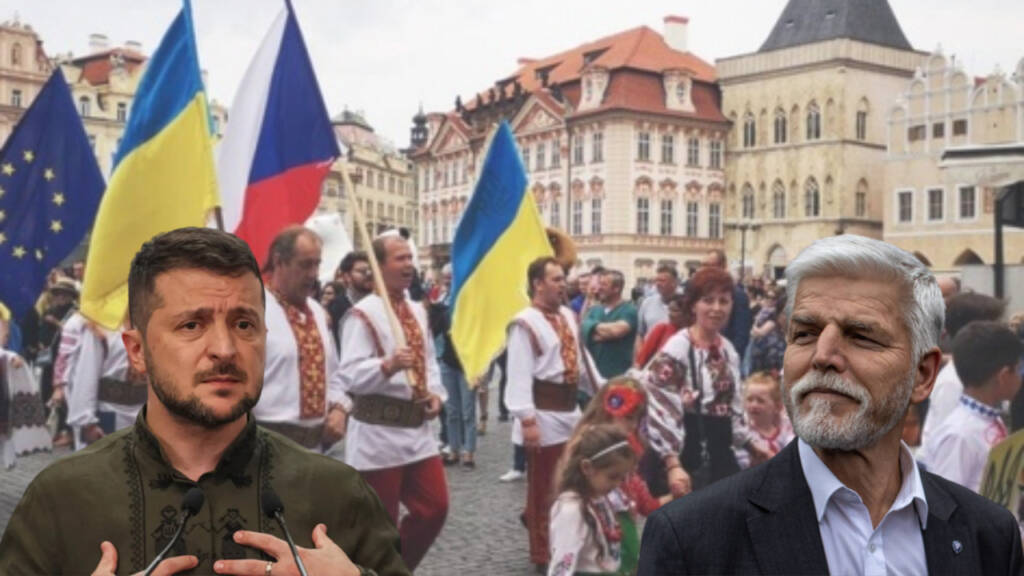The Russia-Ukraine war prompted the Czech Republic to exhibit anti-Russian sentiments, resulting in discrimination against Russians residing there. This prejudice led to the targeting of ethnic Russians. President Petr Pavel once advocated for the expulsion of all ethnic Russians from Czech soil. However, the current scenario indicates a shift in this disposition.
Unraveling Czech-Russian Relations
European nations have exhibited discriminatory behaviour towards Russians, a sentiment echoed by Czech President Petr Pavel. He endorsed intensified surveillance of Russians residing in Western countries, citing parallels with the strict monitoring of Japanese by Americans during World War II.
He asserted that security measures for Russian nationals during wartime should surpass those in times of peace, emphasising stricter monitoring. “All Russians living in Western countries should be monitored much more than in the past,” he opined, drawing an analogy to the surveillance and security scrutiny endured by Japanese by Americans during the aforementioned conflict.
However, a peculiar realisation seems to have dawned upon President Pavel, altering his perspective.
Public Outcry and Political Consequences
Pavel’s position encountered mounting opposition within the public sphere. The Russia-Ukraine conflict triggered a surge in the cost of living across Europe, prompting inhabitants to engage in demonstrations within Prague, leading to the resignation of officials. Escalating energy expenses became a source of discontent among citizens, motivating their participation in street protests characterised by anti-NATO sentiments. The city of Prague witnessed substantial rallies, united in the objective of toppling the incumbent Czech government that leaned towards NATO and opposed Russia.
Read More: Another nation rises up for Russia and leaves its anti-Russia govt. baffled
A notable assembly of approximately seventy thousand individuals congregated in the Czech capital, vehemently protesting against the escalating energy costs. Concurrently, the demonstrators expressed their displeasure towards the European Union and NATO, which appeared to correlate with their disapproval of the prevailing socio-economic conditions. This collective demonstration signified a critical public reaction to both the financial predicament induced by the Russia-Ukraine conflict and their dissatisfaction with the country’s alignment on the international stage.
Revisiting Refugee Policies in Czechia
In the context of housing benefits, individuals residing in registered flats within Ukraine are afforded a monthly allowance of €125. Furthermore, refugees, distinguished by their vulnerability, are recipients of humanitarian aid. A hierarchical approach to financial support exists, wherein children, students, and senior citizens receive a more substantial assistance of approximately €200 per month, while others receive approximately €130. Supplementary benefits are extended to those individuals confronting disabilities, aiming to address their specific needs.
The influx of refugees has induced a sense of unease within the local population. The government has responded by issuing 450,000 visas and facilitating access to financial aid, along with work permits, for Ukrainian nationals. However, the utilization of taxpayer funds for these initiatives has elicited discontent among local residents, culminating in protest activities.
A ray of relief has emerged for the local populace, as the aforementioned measures are currently undergoing cessation.
Shifting Dynamics in Czech Leadership
Pavel swiftly grasped the prevailing public sentiment, prompting a discernible shift in his stance towards Ukraine. Czechia has recently adopted a policy of curbing benefits provided to Ukrainian refugees, a measure that has contributed to notable fiscal savings amidst the nation’s economic consolidation efforts. This recalibration has resulted in a reduction of more than a third in the financial outlay associated with Ukrainian refugees.
In the month of June 2023, the state’s disbursement for humanitarian aid and solidarity grants amounted to nearly €71 million, a figure that saw a decline to approximately €46 million by the subsequent month of July. This fiscal prudence can be attributed to the implementation of the “Lex Ukraine” legislation, which introduced comprehensive changes to the framework governing refugee benefits. This legislative change officially took effect in July 2023.
Czech Labour Minister Marian Jurečka, representing the KDU-ČSL party within the European People’s Party (EPP), corroborates the impact of these modified conditions on expenditure reduction. Minister Jurečka underscores that these amendments have prompted certain refugees to return to Ukraine, resulting in both financial and demographic adjustments.
Read More: Odessa is Almost in Putin’s Grasp Now
Public Sentiment and Political Realignment
Prague is actively pursuing transformation, with citizens echoing the sentiment of ‘Czech First,’ inspired by Donald Trump’s rhetoric, as a means to emphasize economic revitalization. Demands extend to the restoration of diplomatic ties with the Kremlin and the stabilization of prices, given the significant 18 percent inflation observed in September 2022 within the Czech Republic. Presently, as a strategic move to secure his position, Petr Pavel is advocating for the removal of Ukrainians from the country.
Petr Pavel’s initial aggression targeting ethnic Russians, coupled with extravagant benefits for Ukrainian refugees, garnered public dissatisfaction. His recent about-face, attempting to expel Ukrainian migrants, appears as a reactive measure. Yet, this abrupt U-turn may prove inadequate to regain public trust. His shifts in stance reflect inconsistent leadership, potentially rendering these efforts too little, too late to salvage his credibility amidst a populace seeking coherent and principled governance.
Watch More:
